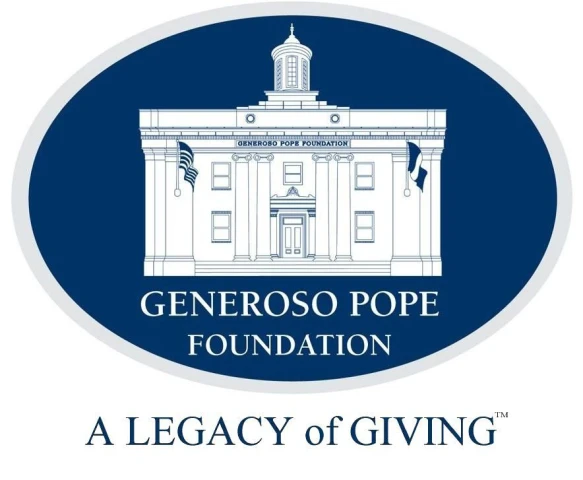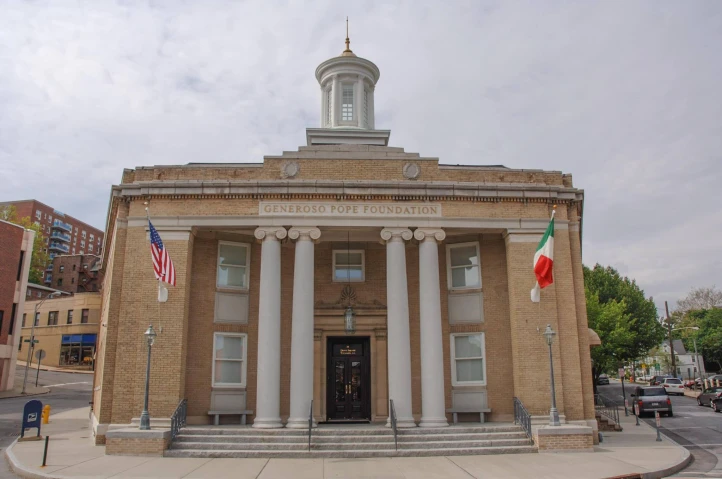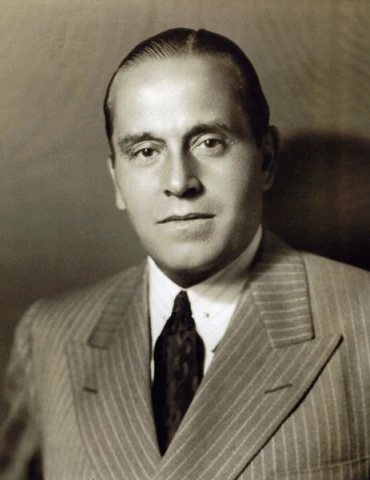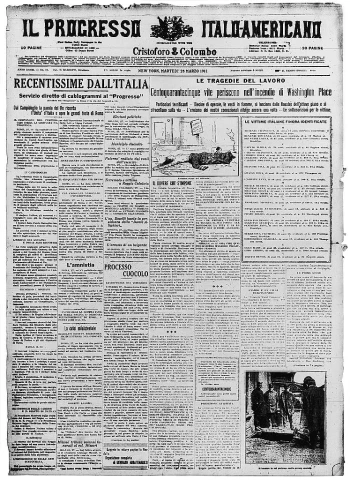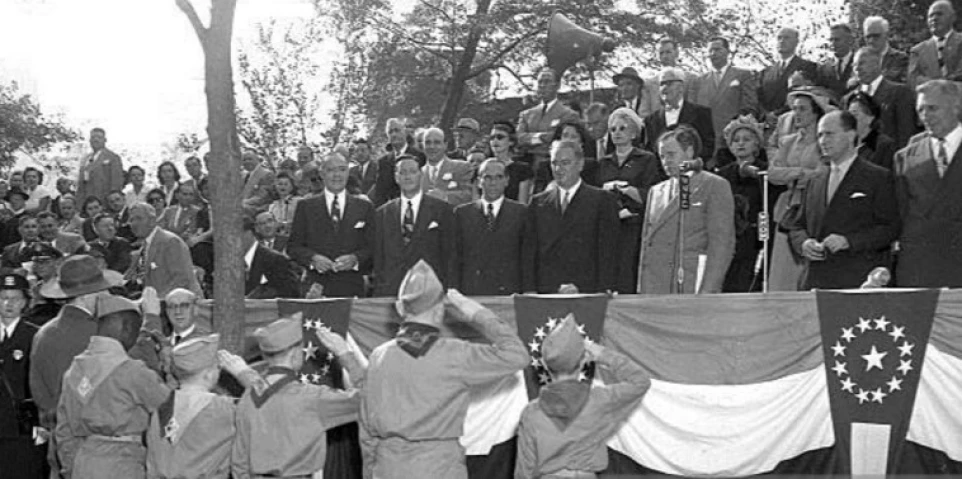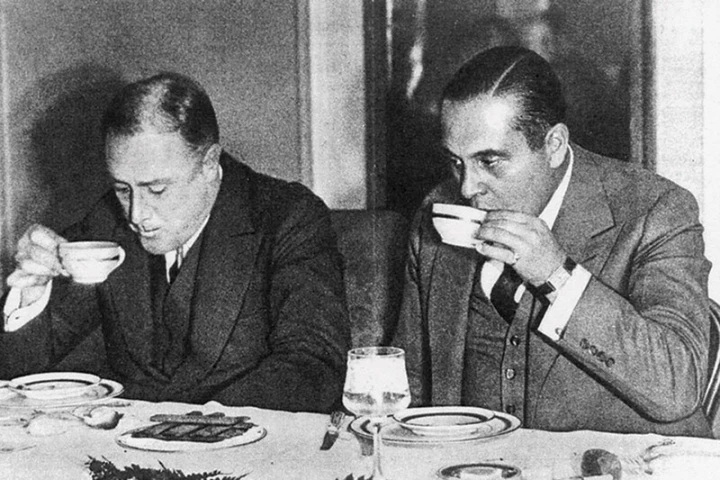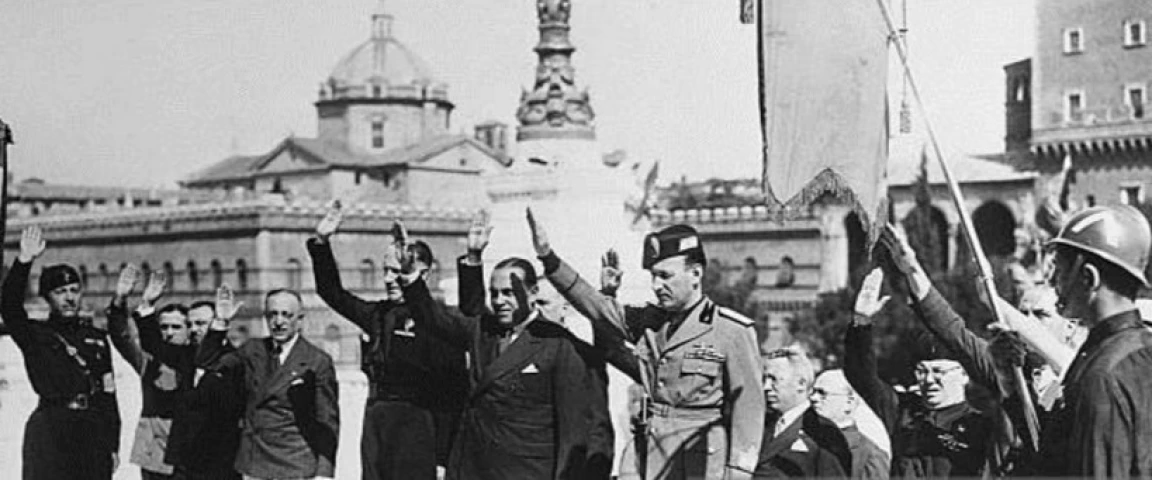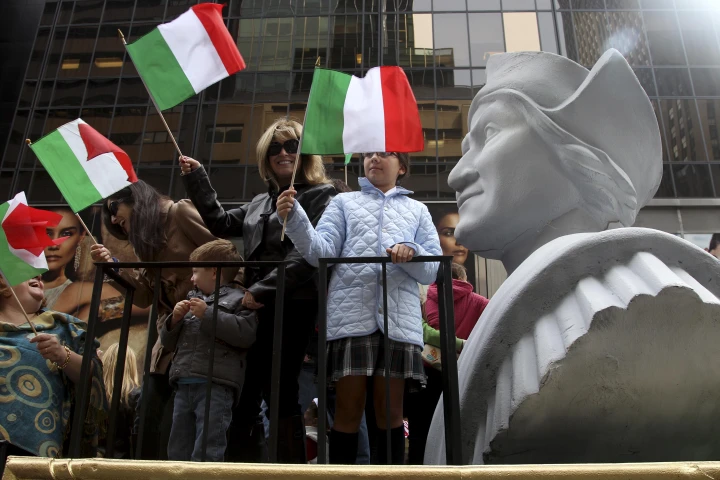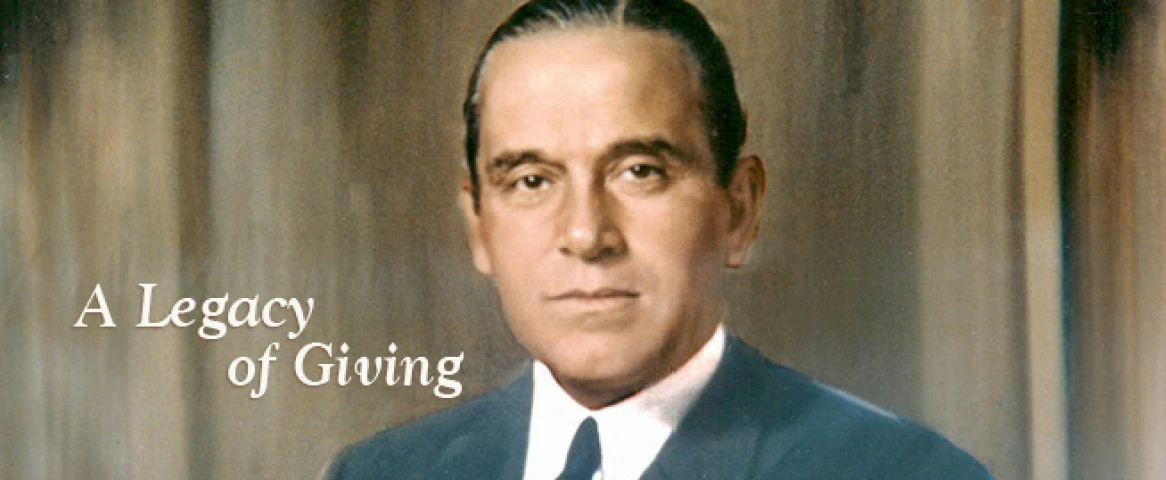Generoso Pope was one of the most important Italian Americans of the XX century. A kid who came to the US with a few bucks in his pocket, he became a king in the construction business in the growing New York with its ever-changing skyline.
Generoso Pope was behind the most important media in the history of the Italian American community, the newspaper "Il Progresso Italo-Americano"; and gave birth and the City official recognition to the Columbus Day Parade in New York. Our guest today is his great-grandson, David Anthony Pope
Mr. Pope, you are the President and Chief Executive Officer of the Generoso Pope Foundation in Tuckahoe, NY. First of all, we ask you to tell us something about the Foundation
The foundation was started in 1947 by Generoso Pope. He wanted to do that because he always believed in giving back to the community in which his business flourished.
Within the Foundation we fund a lot of different activities. The majority has now shifted to helping children, so it could be anything from helping with hospitals to scholarships for education to upgrading educational facilities.
It's very important that the Foundation, besides giving to children, also does give to many different causes: we help communities, we fund cancer research, and of course one of the main focuses is supporting the Italian American community.
Your great-grandfather Generoso Pope is without a doubt one of the most important and famous Italian Americans of all time. We would like to ask you about him from three different perspectives. The first one is the description of a self-made man who started from scratch and became one of the most important and rich entrepreneurs of the history of New York
He came over from Italy with 2 dollars and 50 cents in his pocket: and we still have that 2 dollars and 50 cents that he came over with, we cherish that!
He worked as a sandhog and water boy on the Pennsylvania Railroads, he worked his way up and then essentially took over the company when it was going bankrupt and then turned that company around to be the largest cement and gravel supplier in the world.
He then expanded into other avenues, from newspapers, 7 different Italian American newspapers, to the radio, and then he went into other business ventures.
He essentially worked his way up through New York, and became extremely successful, which was very hard at the time. There was a lot of business going on, a lot of building going on but there was also a lot of competition, so he had to be extremely savy and tactical in the way he ran his business. And obviously, he was extremely successful!
The second angle from which we ask you to tell us about Generoso Pope is the Italian American one: he arrived to the US at 15 years old with almost nothing and America granted him the chance to become such a successful man. From Il Progresso Italo-Americano to the founding of the New York Columbus Day in 1929, he truly embodied the Italian American experience
Generoso Pope came to America because the opportunity was obviously better here at that time. He loved America, but he also loved his motherland: it was a balance for him, he had to support Italy and also support everything he was doing in America so his business could be successful.
He thought that the portrait of the Italians in America was a very important issue. There were a lot of disparaging remarks, stereotypes, whether in shows or in movies or whatever. He used to say "always put your best foot forward and don't look back": so you can battle the TV shows, you can battle the movies but the success of your business and the way you carry yourself will essentially dispel what the stereotypes are about.
He purchased seven Italian American newspapers throughout the US. There was no internet back then, the Italians that came over always looked for a newspaper. Everyone you talk to, generation after generation, they always sent their son or they grandson down to the newstand to buy Il Progresso or other newspaper. Il Progresso Italo-Americano was definitively the voice and the information of the Italians in America, so they could learn what was going on in their homeland and also what was going on in the Italian communities in the US.
One of the most important in this direction was to create the Columbus Day Parade in New York City, and get that into the city charter. There are only two parades in New York that are in the city charter, Saint Patrick Day Parade and the Columbus Day Parade, and that means they do not have to apply to the city for permit every year, it's automatic. It was very, very hard to obtain, but Generoso Pope did it because he wanted to make sure and perpetually, even when he would be gone, that the heritage of the Italian Americans would be displayed and shown year after year: it was very important to him.
The third aspect of his incredible life is the one regarding his public role, which has been an important aspect of his activity towards Italy and the United States for several years
He always felt obligated to Italy, and there came a point when his support to Italy would mean to support Mussolini, before he allied himself with Hitler: that became a breaking point, because the President of the United States asked him to go over and speak to Mussolini to convince him to disconnect from Hitler. Generoso went over, talked to Mussolini but he was just too far gone in his alignment. So, Generoso came back and he essentially told the President "Mussolini is too far allied, the only thing you can do is to create a campaign to essentially work for the fall of fascism in Italy". From that moment on he worked diligently on that with the United States and his connections in Italy.
He not only had newspapers, but he also had radio stations. He used that influence to create a letter writing campaign from all the Italians that moved to America, the Italian Americans, to write home to their Italian families. In these letters, he asked the Italian Americans to explain that Italy would need to distance itself from Fascism. It was not only a letter writing campaign, there were also pamphlets and he did it in cooperation with the United States Government and he was extremely successful.
He felt he needed to do it because before Mussolini attached himself with Hitler, Generoso was very close with Mussolini. So, he was always dedicated to America, but first and foremost to his homeland and the people of Italy.
If you go through history, it's even documented in different videos, you can see that the Italian American voting bloc, which my great-grandfather was responsible for, was instrumental for the election of Franklin Delano Roosevelt as President. So, this relationship between them became an extremely powerful and influential arm for Generoso's companies; but he also used that for the benefit of the Italian Americans, to help them rise them up to the next level and have them vote. And Roosevelt realized that and embraced it and that helped tremendously giving the Italian Americans their rightful place in America.
With his presidential friendships, Generoso Pope was able to make Columbus Day into a national holiday. What do you think about the attacks toward the Columbus Day that today see local institutions or schools voting to cancel Columbus Day and replace it with Indigenous Day?
I think that you can't forget your history and you have to embrace it. My great-grandfather thought that America was a beautiful place that had so many different nationalities that contributed to one unification. He also felt that was extremely important that every member of every ethnic group, whether Italian, German, Irish, Chinese, Japanese, needed to embrace his or her heritage, to remember where he or she came from, to be proud of that and to display that pride.
What's going on today is that some are trying to blend everyone together and erase people's heritage, but they are not going to be to do that in America and it's not going to be successful. There are so many wonderful countries, and people from all these countries should embrace their heritage and remember what their ancestors did and what their story represents. So, instead of attacking a particular nationality and its origin or symbols, what the people stand for and are proud of, everybody should focus on its own nationality and raise up money to promote their heritage.
I think people use a poor excuse, when they talk against Columbus Day. You could go back when Columbus came to America, talk about the Native Americans and how they were treated: that is part of the history and it was different back then than it is today. People attached to their own history, they become more proud, and that is one of the reasons why we at the Generoso Pope Foundation opened up our cultural center: to help Italians from fourth, fifth, sixth generations to learn about their heritage and have them be proud. That is what we do for the Italian Americans, and I think that every other nationality should do for their people.
I think that the attack on Columbus Day is really not going to be successful. You have some towns, some Universities, but it's really not going to spread: I think it's an irrelevant argument and we will fight it all the way to the end, and like my great-grandfather we will be successful. I'm not really concerned about that!
It is always impossible not to find shadows in a story of such a successful man, and this is no exception: the fight with Carlo Tresca and Tammany Hall, the personal friendship with the crime boss Frank Costello…
Well, people say that Generoso had an affiliation with certain people that were in organized crime: in New York you had obviously a lot of very powerful unions, and, I'm not gonna deny it, there was organized crime. Did it exist? Yeah, it did exist! But what people have to understand is where my great-grandfather was absolutely genius in his business model. Yes, in construction in New York you had to deal with the organized crime figures. But the one thing that he did, which was very very smart, was whether in the asphalt, in the concrete, in the sand and gravel, in all his businesses he kept the profit margin extremely low. And by keeping the profit margin low there was no interest by the organized crime to take over his businesses. When we sold our concrete and our sand and gravel companies, the day after the price of the concrete quadrupled in one day, because we were controlling the price to keep it low. If you are not making a big profit, who wants to take over your business and work that much harder? Once we got out, everyone else obviously jumped in and, because there wasn't any control, then they made a lot of money with the price growing up.
The other thing that my great-grandfather did was that he allied himself with politicians and the Government: he always supported the US Government and New York City. He was always there to help and lend support within Italy and the US. Being so close to the Government, the organized crime really did not want to embrace him, because they would be afraid that he would be too close to law enforcement, and it would shed some light on them. So, that was another angle to essentially keep away the organized crime from taking over or trading any of his businesses.
Did he have to talk to them? Did he have to meet them? I'm sure he did! But the one thing that he always said is "You never take money from them and you run your business at an extremely low profit. You just do a lot of business to make up the difference, and they would want have nothing to do with it because there is a tremendous amount of work that you have to do just to make that money, and that's not going to be of interest!"
Now, about Tresca. Tresca was very vocal against my great-grandfather, and my great-grandfather in America had people that essentially loved him and embraced him for everything that he did. Carlo Tresca decided to attack my great-grandfather, whether was through the newspapers or through interviews. There were people that were so passionate and loving of my great-grandfather, that they took offence to that and saw that as a disgrace to someone who was helping all the Italian Americans.
I know Tresca's daughter and I guess she blames our family for his death, but I think him himself created his destiny, we had nothing to do with that. There were people, whoever they were, essentially disgusted and disgraced and took it upon themselves, which of course was wrong, to go after him: because they were that passionate about protecting my great-grandfather and everything he did for the Italian Americans and Italians. I am not saying it was right, but some people felt that Generoso was their leader in America and Tresca kept attacking and attacking.
Generoso Pope è stato uno dei più importanti italoamericani del ventesimo secolo. Un ragazzo arrivato negli Stati Uniti con pochi dollari in tasca, divenne un re nel settore delle costruzioni nella crescente New York con la sua skyline in continua evoluzione.
Generoso Pope fu l'editore del più importante mezzo di comunicazione nella storia della comunità americana italiana, il quotidiano"Il Progresso Italo-Americano"; e diede vita nonché il riconoscimento ufficiale della città alla parata del Columbus Day a New York. Il nostro ospite di oggi è il suo pronipote, David Anthony Pope
Mr. Pope, leiè il Presidente e Amministratore Delegato della Generoso Pope Foundation aTuckahoe, NY. Prima ditutto, le chiediamo di dirci qualcosa sulla Fondazione
La fondazione fu creata nel 1947 da Generoso Pope. La volle perché ha sempre creduto nella necessità di restituire qualcosa alla comunità in cui la sua attività fiorì.
Con la Fondazione finanziamo molte diverse attività. La maggioranza di esse si è ora spostata verso l'aiuto ai bambini, da finanziare gli ospedali alle borse di studio per l'istruzione, o al sostegno per migliorare le strutture educative.
E' molto importante dire che la Fondazione, oltre all'aiuto ai bambini, ha anche diverse altre cause: aiutiamo le comunità, finanziamo la ricerca sul cancro, e,naturalmente, uno dei nostri principali obiettivi è sostenere la comunità italoamericana.
Il suo bisnonno Generoso Pope è senza dubbio uno dei più importanti e famosi italoamericani di tutti i tempi. Vorremmo chiederle di lui da tre diversi punti di vista. Il primo è la descrizione di un self-made man che ha iniziato da zero ed è diventato uno dei più importanti e ricchi imprenditori della storia di New York
Generoso arrivò dall'Italia con 2 dollari e 50 centesimi in tasca: conserviamo quei 2 dollari e 50 centesimi, sono molto preziosi per noi!
Generoso lavorò come operaio per le Ferrovie della Pennsylvania, si fece strada all'interno del suo organigramma e poi prese possesso della società quando stava andando in bancarotta, portandola ad essere il più grande fornitore di cemento e ghiaia nel mondo.
Come imprenditore poi iniziò a differenziare il suo business, dai giornali –possedeva 7 diversi giornali italoamericani - alla radio, e poi con altre iniziative imprenditoriali.
Il suo successo lo costruì essenzialmente a New York, ed ebbe un enorme successo, cosa molto difficile a quei tempi. C'erano molti affari in corso, moltissime costruzioni, ma c'era anche moltissima concorrenza, e così generoso dovette essere estremamente saggio e dimostrare una notevole tattica nel modo in cui portò avanti la sua attività.
Il secondo angolo in base al quale le chiediamo di raccontarci Generoso Pope è quello italoamericano. Generoso arrivò negli Stati Uniti a 15 anni con quasi nulla e in America trovò la possibilità di diventare un uomo di grande successo. Da Il Progresso Italo-Americano alla creazione del Columbus Day di New York nel 1929,ha veramente incarnato l'esperienza italoamericana …
Generoso Pope venne in America perché ovviamente c'erano più occasioni qui, in quel momento. Amava l'America, ma amava anche la sua patria: erano due amori in equilibrio per lui,che sostenne sempre l'Italia ma che crebbe qui in America il suo business.
Lui pensava che il modo in cui venivano descritti gli italiani in America fosse una questione molto importante. C'erano molti commenti sprezzanti, gli stereotipi, sia negli spettacoli che nei film o in qualsiasi altro mezzo d'informazione. Era solito dire "sempre mettere il piede migliore in avanti e non guardare indietro": si possono combattere i programmi TV, è possibile combattere i film, ma il successo del tuo business e il modo in cui ti comporti sarà ciò che sfaterà definitivamente gli stereotipi.
Acquistò sette giornali italoamericani in diverse parti degli Stati Uniti. Non c'era internet allora, gli italoamericani leggevano i giornali per informarsi. Con chiunque si parli, generazione dopo generazione, si troverà sempre chi mandava il figlio o il nipote all'edicola per comprare Il Progresso, o un altro giornale. Il Progresso Italo-Americano era praticamente la voce e l'informazione degli italiani in America, che da esso potevano comprendere cosa stava succedendo nella loro patria e anche ciò nelle comunità italiane negli Stati Uniti.
Una delle cose più importanti fatte da Generoso Pope in questa direzione fu creare la parata del Columbus Day a New York City, e ottenerne il riconoscimento ufficiale da parte della città. Ci sono solo due parate a New York riconosciute ufficialmente e per sempre, e sono la San Patrick Day Parade e la Columbus Day Parade: significa che non devono richiedere alla città il permesso ogni anno, ma è automatico. Fu molto, molto difficile da ottenere, ma Generoso Pope perseguì e realizzò questo obiettivo perché voleva assicurarsi che perennemente, anche dopo la sua morte, l'eredità degli italoamericani venisse celebrata e mostrata anno dopo anno: era molto importante per lui.
Il terzo aspetto della sua incredibile vita è quello che riguarda il suo ruolo pubblico, un aspetto importante della sua attività verso l'Italia e gli Stati Uniti per diversi anni
Generoso si sentiva sempre obbligato a supportare l'Italia, e ci fu un momento in cui questo supporto significava sostenere Mussolini, prima che si alleasse con Hitler: quello fu il punto di rottura, perché il Presidente degli Stati Uniti chiese a Generoso di andare in Italia e parlare a Mussolini per convincerlo a rompere l'alleanza con Hitler. Generoso lo fece, ma l'alleanza era ormai troppo consolidata. Così, Generoso tornò in America e sostanzialmente disse a Roosevelt "Mussolini è troppo convinto dell'alleanza, l'unica cosa da fare è creare una campagna per lavorare per la caduta del fascismo in Italia". Da quel momento in poi, lavorò diligentemente su questo obiettivo insieme con gli Stati Uniti ed i suoi collegamenti in Italia.
Aveva i giornali, e le radio, e usò la sua influenza per creare una campagna via posta con lettere scritte dagli italiani che si erano trasferiti in America, gli italoamericani,alle loro famiglie italiane. In queste lettere, Generoso chiedeva agli italoamericani di spiegare che l'Italia aveva bisogno di prendere le distanze dal fascismo. Non era solo una campagna di lettere, c'erano anche opuscoli, e fu fatto in collaborazione con il governo degli Stati Uniti: e fu un grande successo.
Lui sentiva che aveva bisogno di farlo perché prima che Mussolini si alleasse con Hitler, Generoso era stato molto vicino a Mussolini. Quindi generoso aveva nel cuore l'America, ma prima ancora c'era la sua patria e la gente d'Italia.
Se analizziamo i flussi elettorali, è anche documentato in diversi video, si può vedere che il blocco elettorale italoamericano, di cui in qualche modo il mio bisnonno era responsabile, fu determinante per l'elezione di Franklin Delano Roosevelt come Presidente. Quindi, questo rapporto tra di loro divenne una risorsa estremamente potente e influente perle aziende di Generoso; ma lui lo usò anche per il bene degli italoamericani, per aiutarli ad aumentare il loro livello sociale ed economico, grazie al loro voto. Roosevelt se ne rese conto e contribuì enormemente dare gli italoamericani il loro giusto posto in America.
Con le sue amicizie presidenziali, Generoso Pope fu anche colui che rese il Columbus Day una festa nazionale. Cosa ne pensa degli attacchi verso il Columbus Day che oggi vedono istituzioni o università votare per annullare il Columbus Day e sostituirlo con l'Indigenous Day?
Penso che non si può dimenticare la propria storia, e anzi bisogna accoglierla. Il mio bisnonno pensava che l'America fosse un posto bellissimo, anche perché così tante nazionalità diverse avevano contribuito a renderlo unito. Ma sentiva anche che era estremamente importante che ogni membro di ogni gruppo etnico, sia italiano, tedesco, irlandese,cinese, giapponese, dovesse accogliere il proprio patrimonio culturale, per ricordare da dove lui o lei era venuto/a, per essere orgoglioso di questo e per mostrare questo orgoglio.
Quello che sta succedendo oggi è che alcuni stanno cercando di fondere tutti insieme e cancellare il patrimonio culturale della gente, ma qui in America non ci riusciranno. Ci sono così tanti Paesi meravigliosi, e le persone provenienti da tutti questi Paesi dovrebbero apprezzare le loro origini e ricordare ciò che i loro antenati hanno fatto e ciò che la loro storia rappresenta. Così, invece di attaccare una particolare nazionalità e la sua origine o i suoi simboli, che rappresentano tanto per la gente che ne va orgogliosa, tutti dovrebbero concentrarsi sulla propria nazionalità e raccogliere soldi per promuovere il loro patrimonio culturale.
Penso che si stia usando una scusa di basso livello, quando si parla contro il Columbus Day. Si può andare indietro nel tempo a quando Colombo arrivò in America, parlare dei nativi americani e di come sono stati trattati: questo è parte della storia ed allora le cose erano molto diverse da oggi. Le persone che hanno a cuore il proprio patrimonio culturale ne diventano più orgogliose, e questo è uno dei motivi per cui noi della Generoso Pope Foundation abbiamo dato vita al nostro centro culturale: per aiutare gli italiani di quarta, quinta, sesta generazione a conoscere la loro eredità e ad esserne orgogliosa. Questo è ciò che facciamo per gli italoamericani, e penso che ogni altra nazionalità dovrebbe fare lo stesso per il loro popolo.
Penso che l'attacco al Columbus Day non avrà successo. Ci sono stati certamente episodi in alcune città, alcune università, ma non si sta davvero diffondendo. Penso che dietro tutto ciò ci sia un argomento irrilevante e ci batteremo fino alla fine contro di esso, e come il mio bisnonno avremo successo. Io non sono affatto preoccupato su questo!
E' sempre impossibile non trovare alcuna ombra in una storia di un uomo così di successo, e anche il caso di generoso Pope non fa eccezione: la guerra con Carlo Tresca e Tammany Hall, l'amicizia personale con il boss Frank Costello ...
Beh, c'è chi dice che Generoso era affiliato con certe persone che erano nella criminalità organizzata: a New York c'erano ovviamente diverse organizzazioni molto potenti, e, non ho intenzione di negarlo, c'era la criminalità organizzata. Esisteva? Sì, esisteva! Ma quello che la gente deve capire è che il modello di business del mio bisnonno era assolutamente geniale. Sì, nel settore delle costruzioni a New York si doveva trattare con personaggi del crimine organizzato. Ma quello che fece Generoso, che era molto molto intelligente, fu di mantenere per tutte le sue imprese, sia che si trattasse di asfalto, di cemento, di sabbia e di ghiaia, un margine di profitto estremamente basso. E mantenendo basso il margine di profitto, non c'era interesse da parte della criminalità organizzata di occuparsi delle sue imprese. Quando abbiamo venduto la nostra compagnia, che al suo interno aveva aziende che si occupavano di sabbia e ghiaia e cemento, il prezzo del calcestruzzo si è quadruplicato nel solo giorno successivo, perché noi stavamo controllando il prezzo per tenerlo basso. Se non si sta facendo un grande profitto, nessuno vorrà controllare il tuo business e lavorare ancora più duramente di quanto faccia tu. Una volta usciti noi, sono entrati altri e poiché non c'era più alcun controllo, hanno fatto un sacco di soldi mentre i prezzi salivano.
Generoso si alleò con i politici della città e il governo: ha sempre sostenuto il governo degli Stati Uniti e New York City. Lui era sempre pronto ad aiutare e a dare sostegno, in Italia e negli Stati Uniti. Essendo così vicino al governo, la criminalità organizzata in realtà non voleva interessarsi a lui, perché aveva paura di affiliarsi a qualcuno troppo vicino alle forze dell'ordine, e la cosa avrebbe finito per fare luce anche su di loro. Anche questa strategia era finalizzata a tenere lontana la criminalità organizzata dalle sue aziende.
Parlava con alcuni di loro? Li incontrava? Sono sicuro di sì! Ma quello che sempre detto è stato questo: "Non prendere soldi da loro e tieni il margine di profitto basso. Basta fare molti affari per guadagnare sommando i profitti bassi, e non vorranno avere a che fare con te perché dovrebbero lavorare moltissimo per fare soldi così, e la cosa non sarà di loro interesse! "
Su Carlo Tresca. Tresca era molto attivo e faceva molto rumore contro il mio bisnonno, e il mio bisnonno in America aveva molte persone che lo amavano e lo apprezzavano per tutto quello che faceva. Carlo Tresca decise di attaccare Generoso, sia attraverso i giornali o che facendo molte interviste. C'erano persone che erano così appassionate e amavano così tanto il mio bisnonno, che si scandalizzavano per ciò che vedevano e ritenevano una disgrazia attaccare chi stava aiutando così tanto tutti gli italoamericani.
Conosco la figlia di Tresca e credo che lei incolpi la nostra famiglia per la sua morte, ma credo che lui stesso sia stato artefice del suo destino, noi non abbiamo avuto niente a che fare con questo. C'erano persone, chiunque essi fossero, praticamente disgustati e furono loro che lo uccisero, naturalmente sbagliando: perché volevano proteggere appassionatamente il mio bisnonno e tutto ciò che aveva fatto per gli americani e gli italoamericani. Non sto dicendo che sia stato giusto, ma alcune persone ebbero la sensazione che Generoso fosse il loro capo in America, e Tresca continuava ad attaccarlo senza sosta.


